How AI HR Startups Are Redefining Workforce Management
Discover how AI HR startups are transforming hiring, DEI, and workforce management with ethical, personalized, and global-ready tools.
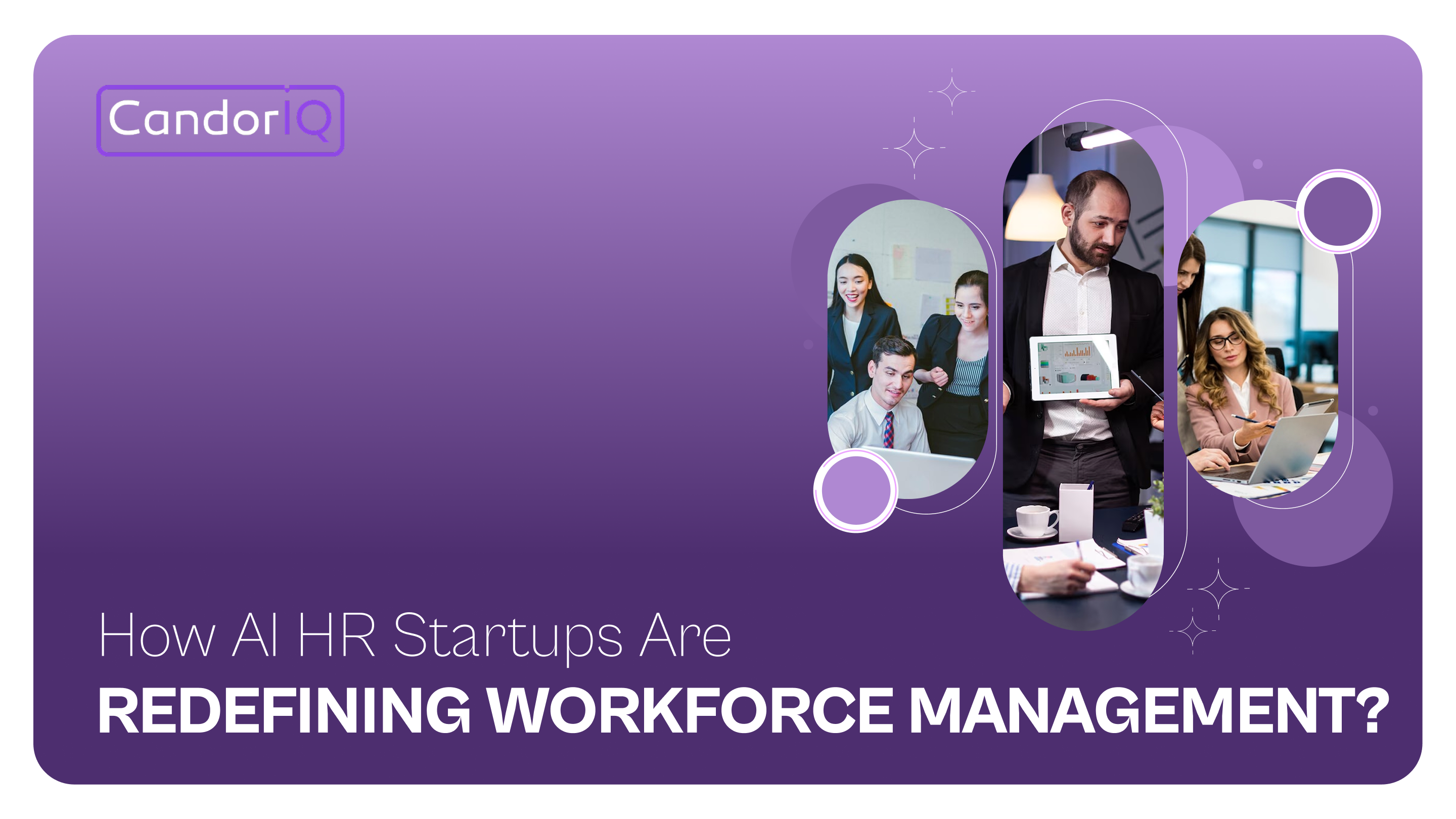
AI HR startups are reshaping the future of workforce management with innovative solutions. We understand how overwhelming it can feel for HR teams to keep up with rapid changes while trying to maintain efficiency, fairness, and a positive employee experience.
By bringing smart automation, predictive analytics, and personalized employee experiences to the table, these startups are transforming traditional HR practices.
In today’s fast-moving world, where efficiency and agility matter more than ever, AI-powered HR tools are essential. They enable HR teams to make faster, data-driven decisions while ensuring fairness and transparency in processes.
As organizations look to simplify operations, AI reduces human error and improves overall productivity. In this blog, you’ll explore how AI HR startups are reshaping HR, from improving hiring and employee experience to supporting DEI, and what the future holds for these innovations.
Key Takeaways:
- AI accelerates recruitment, automates tasks, reduces bias, and improves candidate matching for faster, fairer hiring.
- Data-driven insights and predictive analytics help HR make proactive decisions on workforce planning, engagement, and retention.
- Personalized employee experiences, from career development to well-being, boost engagement, satisfaction, and long-term retention.
- AI supports DEI by standardizing evaluations, tracking equity metrics, and promoting inclusive hiring and performance practices.
- Scalable, integrated platforms and emerging trends like multilingual AI and ethical automation future-proof HR operations and workforce management.
Why AI HR Startups Matter More Than Ever?
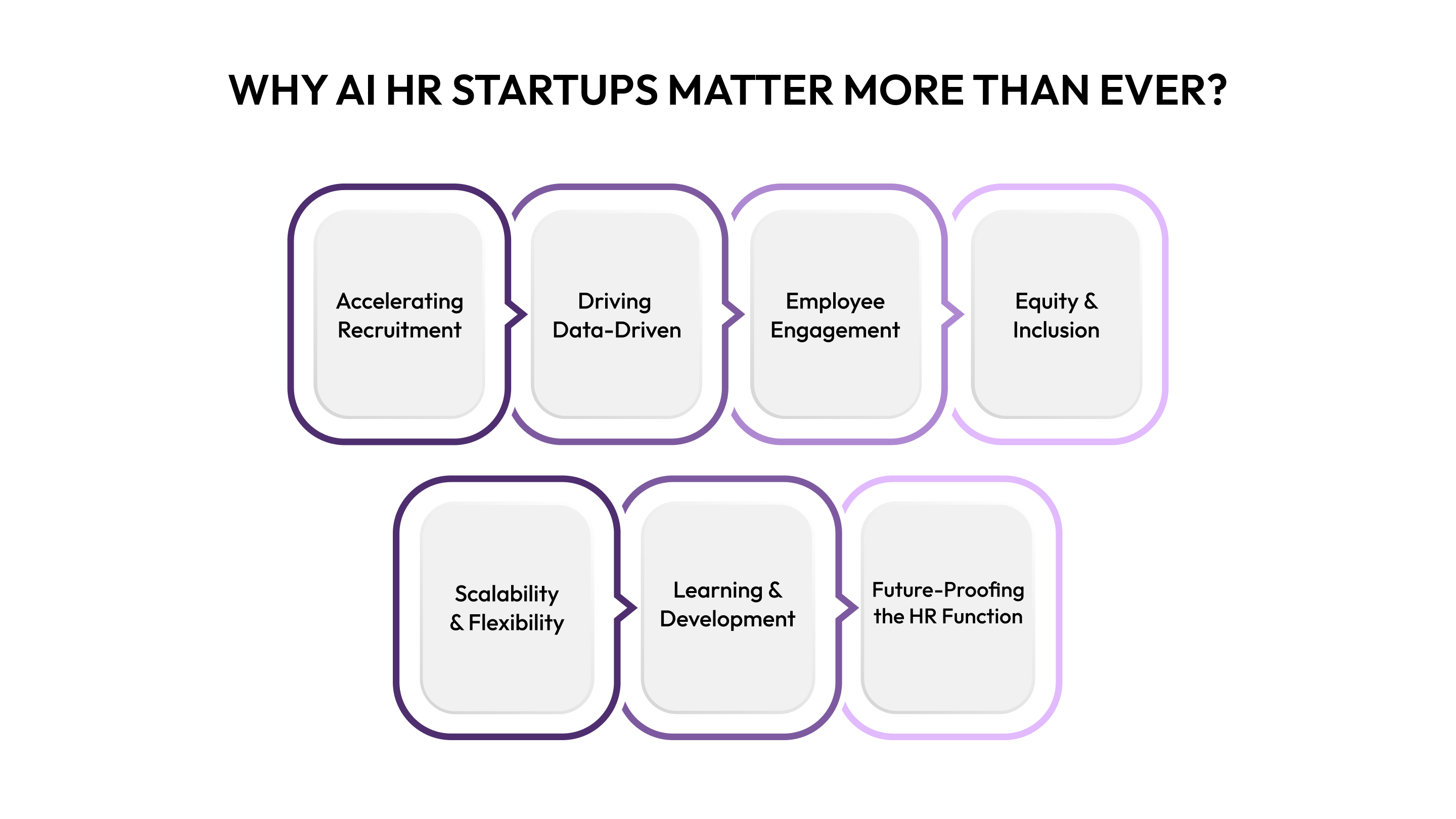
Today, staying agile and efficient is more important than ever. That’s why AI HR startups are stepping into the spotlight, reshaping how HR teams work and helping businesses tackle today’s workforce challenges with smarter tools.
As more companies lean on technology to simplify their HR operations, AI-powered solutions are necessary. These startups are helping HR teams save time, make better decisions, and create more personalized employee experiences.
Here’s why AI HR startups are playing such a big role in the future of HR:
Accelerating Recruitment Efficiency
AI is revolutionizing hiring by taking over time-consuming tasks like sourcing candidates, screening resumes, and scheduling interviews. Instead of going through stacks of applications, HR teams can now focus on strategic decisions and building relationships. It helps:
- Reduce hiring time and expedite candidate selection.
- Improve quality of hire by using data to identify top talent.
- Minimize bias, promoting a more objective and inclusive recruitment process.
Driving Data-Driven Decision Making
AI-powered HR tools give teams access to real-time data on everything from employee performance to turnover risk. Solutions such as CandorIQ provide HR with predictive analytics and insights across hiring, performance, and engagement, helping leaders plan and act strategically.
This shift enables HR leaders to move from reactive to proactive, making decisions based on solid insights. It helps:
- Support smarter, data-backed decision-making.
- Predict challenges like attrition or skill gaps before they arise.
- Align workforce planning with long-term business goals.
Improving Employee Engagement & Retention
Keeping employees engaged and motivated is essential. AI HR startups help monitor sentiment, track performance patterns, and deliver personalized experiences that make employees feel valued. It helps:
- Get real-time feedback from tools that allow quick responses to engagement issues.
- Support individualized career development plans.
- Reduce turnover by identifying and solving problems early.
Championing Diversity, Equity & Inclusion (DEI)
AI is playing a crucial role in advancing DEI initiatives by helping to eliminate unconscious bias in hiring, reviews, and promotions. It helps:
- Enable fairer, data-driven hiring and promotion practices.
- Help build inclusive cultures with diverse leadership pipelines.
- Improve team performance through more equitable representation.
Scalability and Flexibility for Growing Teams
As companies expand globally, AI HR solutions offer the scalability and adaptability needed to manage a growing workforce across regions. It helps:
- Handle high employee volumes without extra admin workload.
- Cloud-based platforms support distributed and remote teams.
- Scale with business needs while keeping HR operations simplified.
Enhancing Learning & Development (L&D)
AI-driven learning platforms provide employees with personalized training based on their roles, goals, and performance, helping them stay engaged and future-ready. It helps:
- Deliver tailored training that’s more relevant and impactful.
- Track skills development with real-time analytics.
- Encourage lifelong learning in an evolving job market.
Future-Proofing the HR Function
AI HR startups are helping organizations stay ahead by integrating cutting-edge tools that adapt to trends like remote work, the gig economy, and evolving employee expectations. It helps:
- Keep HR aligned with the latest technology and workforce trends.
- Support agility in responding to workplace shifts and market demands.
- Future-proof talent management strategies for long-term success.
As AI HR startups continue to gain momentum, it’s helpful to look at the trends that are driving their growth and shaping the way organizations use AI to manage talent today.
Also Read: AI-Powered HR Chatbots for Enhanced Processes and Engagement
Top Trends Driving AI in HR Right Now
AI in HR isn’t just a future trend; it’s already changing the way HR teams work today. As artificial intelligence and machine learning continue evolving, more companies are using these tools to improve everything from hiring to employee engagement and performance tracking.
Let’s explore some of the top trends shaping how AI is being used in HR right now:
AI-Powered Recruitment and Talent Acquisition
AI is revolutionizing recruitment by automating repetitive tasks and improving candidate matching. AI-driven ATS platforms and resume screening tools can quickly filter top candidates based on job criteria, saving time and improving hiring outcomes.
Here’s what’s driving the trend:
- AI tools automate sourcing, screening, and interview scheduling, freeing up time for meaningful candidate engagement.
- Bias reduction through skill-based evaluations helps ensure a fairer recruitment process.
- Predictive hiring models predict candidate success, improving long-term retention and job fit.
Personalized Employee Experience
AI enables truly personalized employee experiences, from onboarding to career development. By analyzing employee data, AI tools tailor development paths, benefits, and engagement strategies to individual needs.
Here’s what’s driving the trend:
- Personalized learning and career plans aligned with employee goals.
- Sentiment analysis tools monitor engagement in real time, guiding timely interventions.
- Improves retention and satisfaction through customized support and growth opportunities.
AI in Employee Performance Management
Performance management is shifting from annual reviews to continuous, real-time feedback, and AI is at the heart of this evolution. AI systems analyze work patterns and provide insights to drive better performance outcomes.
Here’s what’s driving the trend:
- Real-time feedback and performance tracking help HR teams support growth proactively.
- Predictive analytics identify performance risks and opportunities.
- Data-driven insights support fairer, more transparent performance reviews.
AI in Learning and Development (L&D)
As the demand for upskilling grows, AI is helping companies personalize and optimize learning programs. AI-powered learning platforms tailor content to individual needs, ensuring alignment with organizational goals.
Here’s what’s driving the trend:
- Smart LMS tools recommend content based on role, performance, and aspirations.
- Adaptive learning technologies increase engagement and learning retention.
- Continuous development supports agility in a rapidly changing job market.
AI-Driven Employee Well-Being and Mental Health
Employee well-being is now a top priority, and AI plays a growing role in monitoring and supporting mental health. From stress tracking to wellness apps, AI enables proactive support strategies.
Here’s what’s driving the trend:
- Wellness platforms powered by AI offer personalized well-being resources.
- Real-time monitoring helps HR detect early signs of burnout or disengagement.
- Predictive models support preemptive interventions that improve retention and productivity.
Automating HR Operations with AI
AI is simplifying administrative tasks across HR, allowing teams to focus on strategic initiatives. Functions like payroll, benefits, and record-keeping are increasingly automated for greater efficiency.
Here’s what’s driving the trend:
- Automation reduces manual errors and operational overhead.
- AI chatbots provide instant answers to HR-related queries, improving employee self-service.
- Scalable systems enable consistency across global and remote teams.
Advancing Diversity, Equity, and Inclusion (DEI) with AI
AI helps HR teams reduce bias and promote inclusion by analyzing language, processes, and representation throughout the employee lifecycle. Here’s what’s driving the trend:
- AI tools identify biased language in job postings and performance reviews.
- DEI analytics provide visibility into representation and equity metrics.
- AI ensures more inclusive recruitment and promotion practices across the board.
AI in Employee Retention and Talent Mobility
Retaining top talent is critical, and AI supports this by identifying at-risk employees and recommending internal mobility opportunities to keep them engaged. Here’s what’s driving the trend:
- Predictive models flag potential attrition risks based on engagement and performance data.
- Talent mobility tools suggest internal career paths aligned with employee skills and goals.
- Informed decision-making supports a culture of growth and long-term retention.
These trends aren’t just changing processes; they’re reshaping how employees experience work.

AI HR Startups Are Transforming Employee Experience
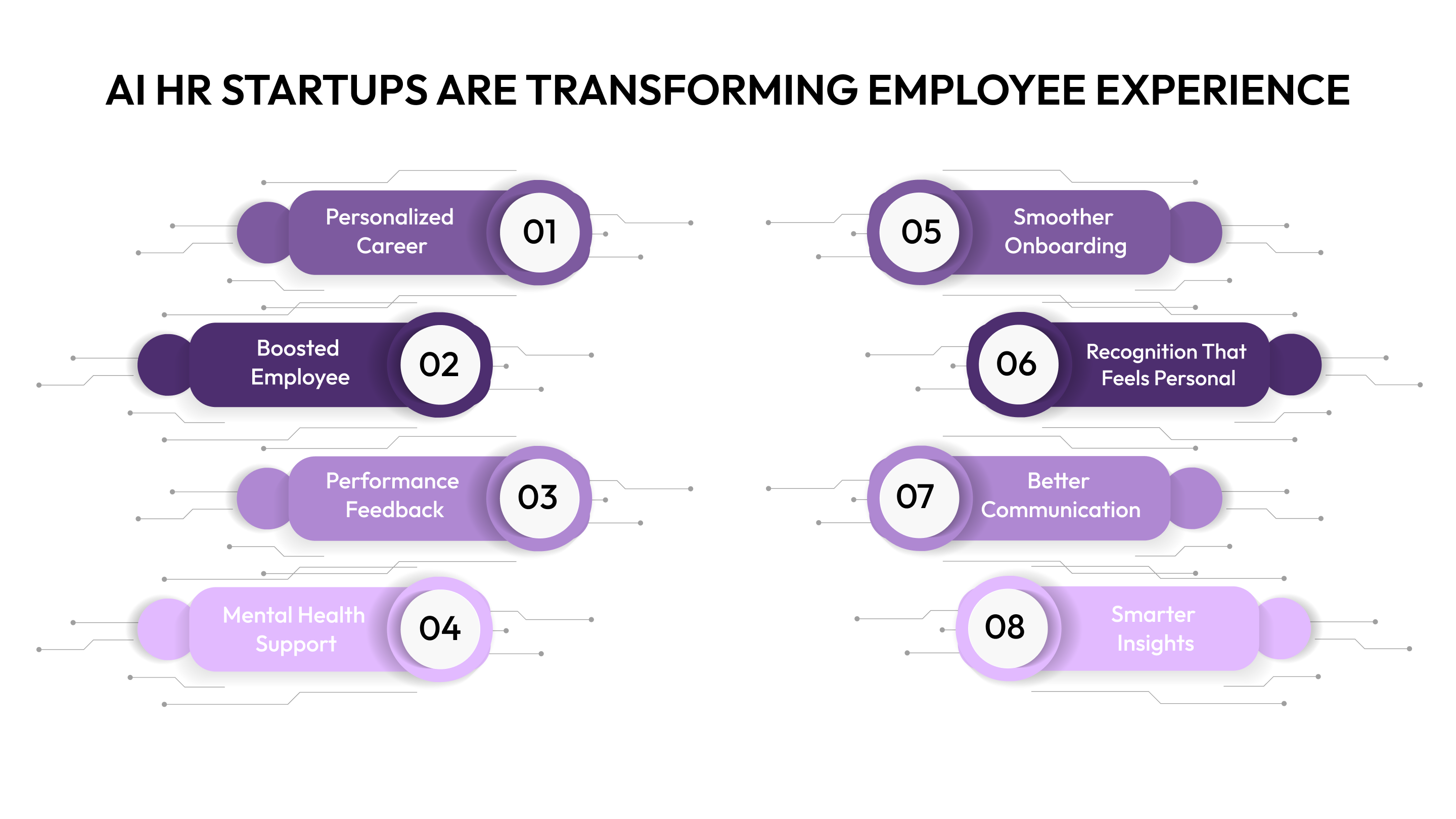
The way organizations think about employee experience has evolved significantly. It’s no longer just about competitive salaries or perks. Today, it’s about creating a work environment that supports personal growth, well-being, engagement, and a strong sense of culture.
As expectations rise, AI HR startups are stepping up with smart, innovative tools that help companies enhance every stage of the employee journey. Here’s how these startups are making a real difference in shaping better employee experiences:
Personalized Career Development
Traditional development programs often take a broad-brush approach, but today’s employees expect more tailored experiences. AI HR startups are changing the game by delivering personalized career growth paths based on individual strengths, goals, and learning styles.
AI is making it happen through the following ways:
- AI-powered platforms assess each employee’s skills and learning preferences, then suggest development plans that align with both personal aspirations and company needs.
- Instead of generic training, employees get recommendations that actually matter to them, making learning more engaging and relevant.
- This targeted approach helps boost motivation, satisfaction, and long-term retention.
Boosted Employee Engagement
Engagement isn’t just a buzzword; it directly impacts performance and retention. AI startups are giving HR teams better tools to understand what employees are thinking and feeling in real-time. Here's how AI helps:
- AI chatbots gather regular feedback and check in with employees, giving HR real-time insight into mood, morale, and concerns.
- Sentiment analysis tools track engagement trends so teams can address issues early before they turn into bigger problems.
- By delivering personalized engagement strategies, AI helps create a workplace where people feel genuinely valued.
Real-Time Performance Feedback
Waiting for annual reviews is outdated. AI is bringing performance management into the now with real-time feedback that supports continuous growth. Here's what AI brings to the table:
- Employees get timely feedback based on actual data and performance, helping them adjust and improve in real time.
- Personalized dashboards give team members visibility into their goals and progress, building clarity and confidence.
- Managers receive AI-generated insights, allowing them to support their teams more effectively and proactively.
Well-being and Mental Health Support
Employee well-being is now a business priority, and AI tools are helping companies support their people more effectively. Here's how AI supports wellness:
- AI monitors patterns like stress signals or changes in engagement and flags concerns before they escalate.
- Employees can access personalized wellness tools, like mindfulness resources, fitness programs, or mental health support, tailored to their individual needs.
- With real-time check-ins, HR can respond quickly to burnout risks and build a healthier workplace culture.
Smarter, Smoother Onboarding
The first days at a new job set the tone for an employee’s journey. AI startups are helping companies deliver a smoother, more engaging onboarding experience. Here's what has improved with AI:
- Chatbots guide new hires through paperwork, policies, and benefits, making the admin side of onboarding faster and easier.
- Personalized onboarding plans are created based on the role and team, ensuring each employee gets what they need from day one.
- AI even helps connect new hires with teammates, making them feel welcomed and included right away.
Recognition That Feels Personal
Recognizing good work matters, but it’s even better when it’s meaningful and timely. AI is helping organizations create smarter, more personalized reward systems. Here's how AI is changing recognition:
- Platforms can automatically highlight milestones, like project completions, goals met, or anniversaries, and notify managers to celebrate them.
- AI tailors rewards to what employees actually care about, whether that’s public praise, extra time off, or a gift card.
- This kind of consistent, personal recognition builds a positive culture and strengthens team morale.
Better Communication, Wherever You Work
As teams become more distributed, communication becomes more critical and more complex. AI tools are helping bridge that gap. Here's how AI is improving connections:
- AI chatbots help employees get quick answers to HR questions, reducing friction and saving time.
- Smart tools ensure announcements, updates, and check-ins reach everyone, no matter where they work.
- Collaboration platforms powered by AI help remote and hybrid teams stay on the same page and work more effectively together.
Smarter Insights for Smarter Decisions
At the heart of all these changes is data, and AI is helping HR teams turn that data into action. Here's why it matters:
- AI gathers and analyzes data from across the organization, surfacing insights that help HR spot issues early and measure what’s working.
- From engagement to performance and well-being, these insights support better decision-making and more strategic planning.
- Instead of reacting, HR teams can be proactive, improving programs before problems arise.
As employee experiences evolve with AI, the technology is also simplifying one of the most critical HR processes, hiring.
You Might Also Like: A Comprehensive Guide to AI for HR Automation and Solutions
How AI Is Making Hiring Faster and Fairer?
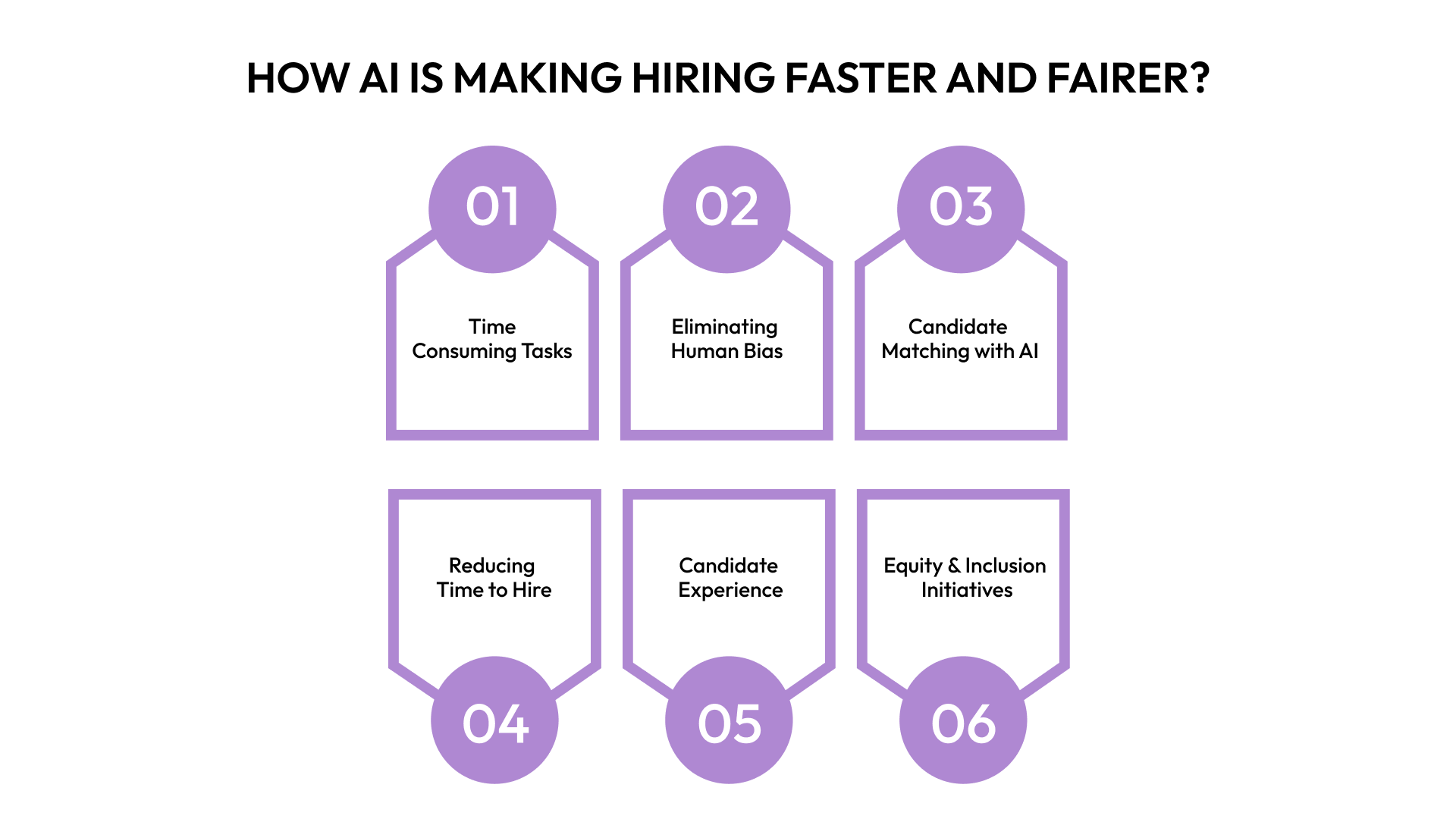
Today, companies need to find the right talent quickly, without sacrificing quality or fairness. That’s where AI is stepping in to make a real difference. By bringing speed, accuracy, and objectivity to the hiring process, AI is helping HR teams not only hire faster but also build more inclusive and diverse teams.
Let’s take a closer look at how AI is reshaping recruitment for the better:
Automating Time-Consuming Tasks
Recruitment often involves repetitive, time-consuming tasks like screening resumes, scheduling interviews, and responding to candidate inquiries. AI-powered tools are transforming this by automating much of the administrative work, allowing HR professionals to focus on higher-value tasks and strategic decision-making.
Here's how AI makes it faster:
- Resume Screening: AI can scan and evaluate thousands of resumes in minutes, identifying top candidates based on role-specific qualifications and experience.
- Automated Interview Scheduling: AI tools can coordinate interviews by syncing calendars and handling scheduling logistics, eliminating back-and-forth emails.
- Chatbots for Initial Interaction: AI chatbots can respond to common candidate questions, provide updates, and help applicants navigate the hiring process with ease.
Eliminating Human Bias in Hiring
AI is helping organizations shift toward fairer, data-driven recruitment by focusing purely on skills, qualifications, and performance indicators, not personal attributes like gender, age, or ethnicity. Here's how AI makes it fairer:
- Bias-Free Recruitment: AI-powered systems analyze candidates based on objective data points, helping reduce bias in resume screening and shortlisting.
- Standardized Interviews: AI can ensure all candidates receive the same questions and evaluation criteria, bringing consistency and fairness to the process.
- Fair Evaluation of Potential: AI evaluates capabilities, patterns of success, and qualifications to help identify talent based on merit, not assumptions.
Enhancing Candidate Matching with AI
AI takes candidate matching to the next level by evaluating large volumes of data to identify the best fits for each role by experience, skills, culture, and behavioral traits. Over time, these systems get smarter, learning from past hiring decisions to improve future recommendations.
Here's how AI makes it faster:
- Predictive Analytics: AI tools use historical hiring data to predict which candidates are most likely to win for a specific role.
- Advanced Filtering: AI filters and ranks candidates quickly based on predefined criteria, accelerating the early stages of hiring.
And, here's how AI makes it fairer:
- Data-Driven Decisions: With AI, decisions are rooted in data, reducing subjectivity and leveling the playing field for all applicants.
- Holistic Assessments: AI evaluates a broader set of competencies, such as critical thinking or adaptability, creating a more inclusive view of candidate potential.
Reducing Time to Hire
Lengthy hiring cycles can cost companies top talent. AI reduces time to hire by optimizing every stage of the recruitment process, from screening to feedback loops, enabling HR teams to move quickly without compromising on quality.
Here's how AI makes it faster:
- Pre-Screening: AI can instantly assess resumes and online profiles to shortlist candidates based on relevance and suitability.
- Real-Time Communication: Automated notifications keep candidates informed at every step, minimizing delays.
- Automated Testing: AI-based assessments provide immediate insights into a candidate’s skills and fit, speeding up evaluation.
Improving Candidate Experience
Today’s candidates expect transparency, speed, and personalized engagement. AI helps meet these expectations by offering real-time updates, consistent communication, and smoother processes, all of which contribute to a better overall experience.
Here's how AI makes it faster:
- Quick Updates: AI ensures candidates are never left in the dark, providing real-time notifications on their application status.
- Personalized Engagement: AI platforms deliver tailored messages and content based on a candidate’s journey, keeping them engaged and informed.
And, here's how AI makes it fairer:
- Consistency in Communication: Every applicant receives timely, accurate information, regardless of role or background.
- Transparent Evaluation: AI helps make evaluation processes more transparent, offering clear feedback and next steps, which encourages trust and fairness.
AI in Diversity, Equity, and Inclusion (DEI) Initiatives
AI isn’t just improving efficiency; it’s becoming a powerful tool in advancing DEI goals. By stripping bias out of job descriptions, screening processes, and performance evaluations, AI empowers organizations to build more diverse and inclusive teams.
Here's how AI makes it fairer:
- Bias Detection: AI continuously learns to detect and eliminate bias in hiring algorithms, helping create more equitable outcomes.
- Inclusive Job Descriptions: AI tools help craft inclusive language in job posts, broadening appeal and attracting diverse talent.
- Data-Driven DEI Tracking: AI enables HR teams to track DEI metrics, measure progress, and adjust strategies based on real insights.
While AI is speeding up hiring and making it more equitable, its impact goes beyond recruitment. It’s also playing a key role in promoting diversity, equity, and inclusion across the workplace.
How AI Is Powering DEI in the Workplace?
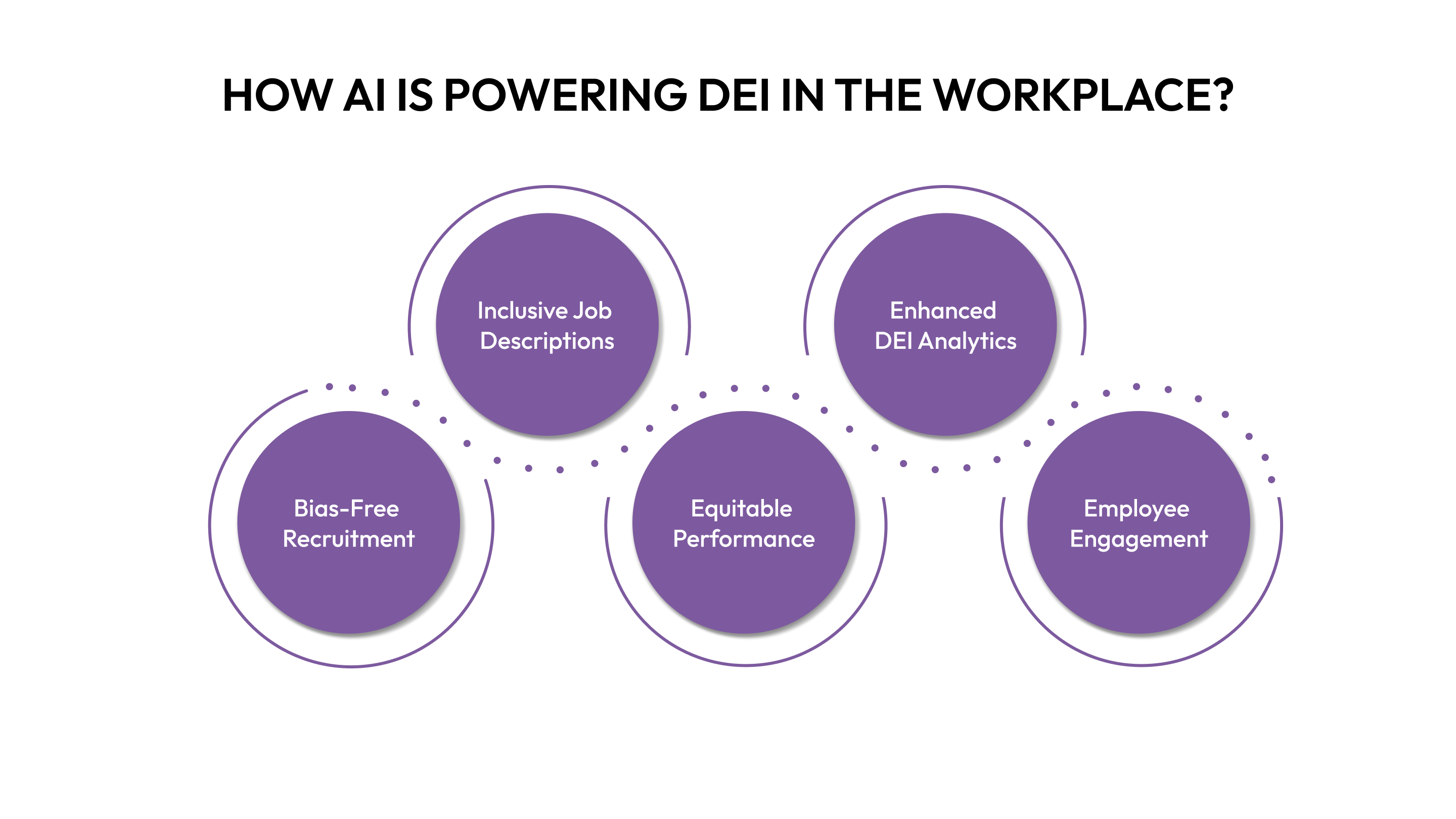
Diversity, equity, and inclusion (DEI) are now essential pillars of building strong, innovative, and high-performing organizations. By bringing objectivity to data analysis and standardizing key workflows, AI helps companies identify gaps, minimize bias, and make more informed, equitable decisions.
Here’s how AI is powering DEI in the workplace:
Bias-Free Recruitment
AI tools can screen resumes and evaluate candidates based solely on skills, experience, and qualifications, removing personal identifiers like gender, age, or ethnicity. This promotes equal opportunity by reducing unconscious bias in the selection process. It also ensures a more diverse candidate pool progresses through various hiring stages.
Inclusive Job Descriptions
AI-powered platforms can analyze and rewrite job postings to remove gendered, biased, or exclusionary language, making them more accessible and appealing to a larger audience. As a result, they encourage applications from underrepresented or diverse backgrounds and expand access to a wider, more varied talent pool.
Equitable Performance Evaluation
AI enables data-driven performance assessments by removing subjectivity and applying standardized metrics across the board. This helps reduce bias in decisions related to promotions, raises, and rewards, while also supporting fair career progression for all employees, especially those from underrepresented groups.
Enhanced DEI Analytics
AI can monitor workforce data and deliver real-time insights into key DEI metrics such as diversity ratios, inclusion scores, and pay equity. These insights offer evidence-based visibility into organizational progress and empower HR teams to continuously refine and optimize DEI strategies.
Inclusive Employee Engagement
AI-driven sentiment analysis tools can interpret employee feedback and highlight concerns, particularly those affecting marginalized or underrepresented groups. This ensures that all voices are heard and considered in decision-making, helping build a workplace culture rooted in inclusion and belonging.
As AI is already transforming hiring and DEI practices, the focus is now shifting to the bigger picture.

Also Read: Data-Driven HR Strategies for Effective Payroll Management
What’s Next for AI HR Startups?
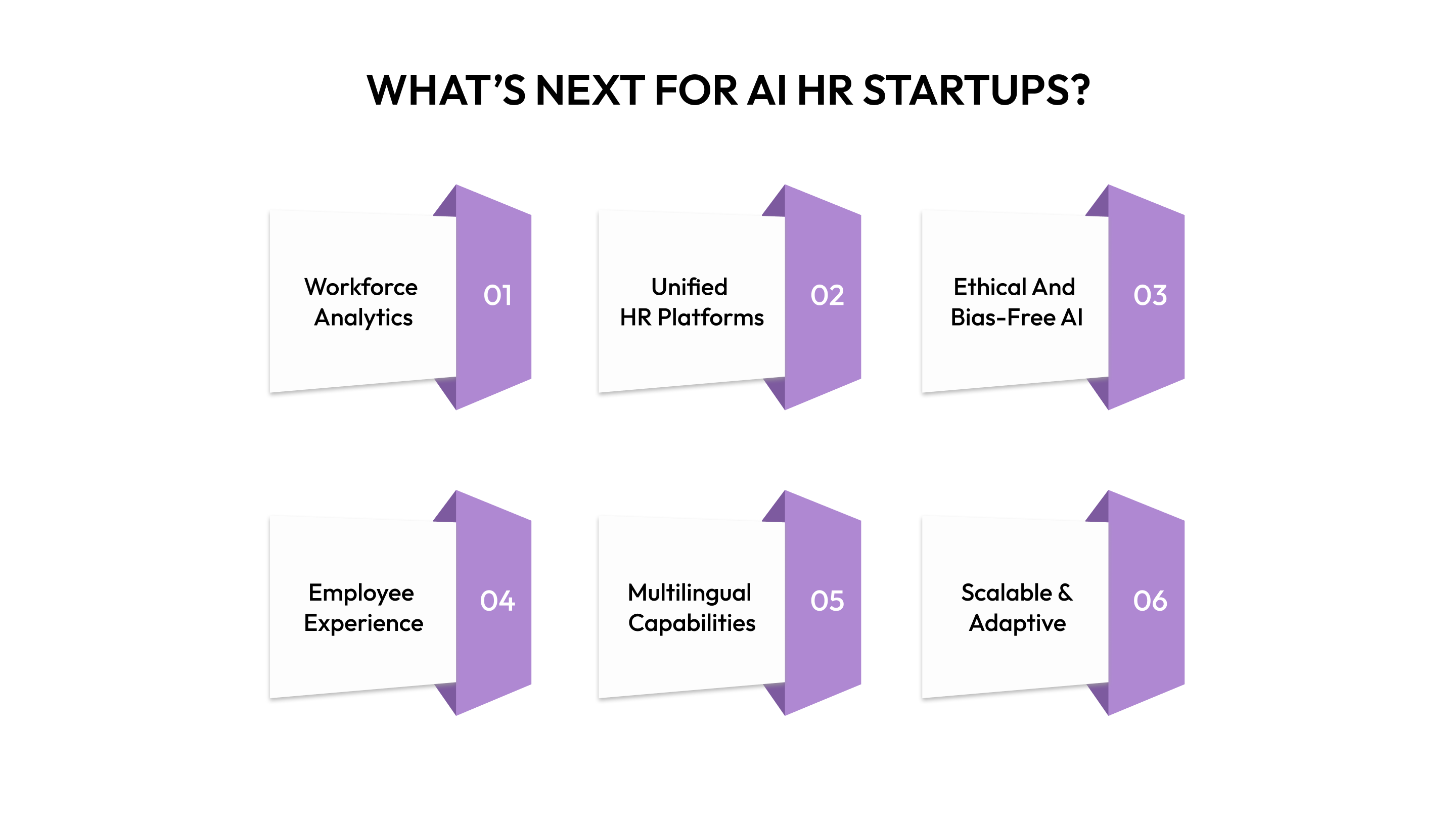
AI HR startups are evolving rapidly, offering solutions that go far beyond simple automation. These innovations are fundamentally reshaping how organizations manage talent, making processes smarter, more ethical, and better integrated. Key developments to watch include:
Predictive Workforce Analytics
Startups will increasingly use AI to anticipate trends in recruitment, retention, and performance. This proactive approach allows HR teams to address potential challenges before they escalate, improving strategic planning and workforce stability.
Unified HR Platforms
Expect deeper integration across recruitment, learning, performance management, and engagement tools. These unified platforms will provide HR teams with a single source of workforce insights, enabling better coordination, data-driven decisions, and smoother employee journeys.
Ethical and Bias-Free AI
Future AI solutions will be built with fairness at the core, eliminating bias, supporting ethical decision-making, and ensuring compliance with global regulations. This is especially critical in sensitive areas like hiring and promotions, where transparency and equity matter most.
Enhanced Employee Experience
AI will drive more personalized experiences across learning, engagement, and career development. By understanding individual employee needs and preferences, these tools will help create a more supportive, responsive, and motivating workplace.
Global and Multilingual Capabilities
As remote and global teams grow, startups will develop AI tools with multilingual interfaces and advanced language understanding. These capabilities will ensure smooth collaboration and communication across geographies, fostering inclusivity and efficiency.
Scalable and Adaptive Solutions
AI tools will become increasingly flexible, making it easy for organizations of all sizes to adopt and customize them. Whether scaling up or pivoting to meet new demands, these solutions will adapt without compromising effectiveness or user experience.
Wrapping Up
AI HR startups are transforming workforce management by offering smart solutions that boost efficiency, improve employee engagement, and make HR more strategic. For businesses aiming to stay competitive, adopting these technologies isn’t optional; it’s key to building a more agile, data-driven, and personalized workplace.
The future of HR is already here, and AI HR startups are leading the way. Using their solutions can simplify operations while creating a more connected and empowered workforce.
CandorIQ is leading the way in this HR transformation with AI-powered tools for headcount planning, compensation benchmarking, and performance management. Our solutions make HR processes more efficient, accurate, and aligned with your business goals.
Book a free demo with CandorIQ today and see how we transform workforce management, support smarter decision-making, and help create a more engaged, productive, and agile team.
FAQs
Q1. How are AI HR startups addressing diversity and inclusion?
A1. AI HR startups use bias-free algorithms to ensure fair recruitment, evaluations, and promotions. By minimizing human biases, they help organizations build more diverse and inclusive workplaces.
Q2. Can AI HR startups replace traditional HR teams?
A2. No, AI HR startups provide tools to automate HR tasks, but they can’t replace the strategic thinking, empathy, and human judgment that HR professionals bring. Instead, they complement HR teams by offering data-driven insights for better decision-making.
Q3. How do AI HR startups improve talent retention?
A3. AI HR startups use predictive analytics to spot at-risk employees, monitor engagement, and suggest retention strategies. Their tools enable HR teams to act proactively, improving satisfaction and reducing turnover.
Q4. How do AI HR startups ensure scalability for global organizations?
A4. Many AI HR startups offer cloud-based solutions that scale across regions, languages, and time zones. This helps global organizations maintain consistent HR practices while adapting to local requirements.
Ready modernize your workforce and compensation strategy?
See how CandorIQ brings workforce planning and compensation together with AI.


